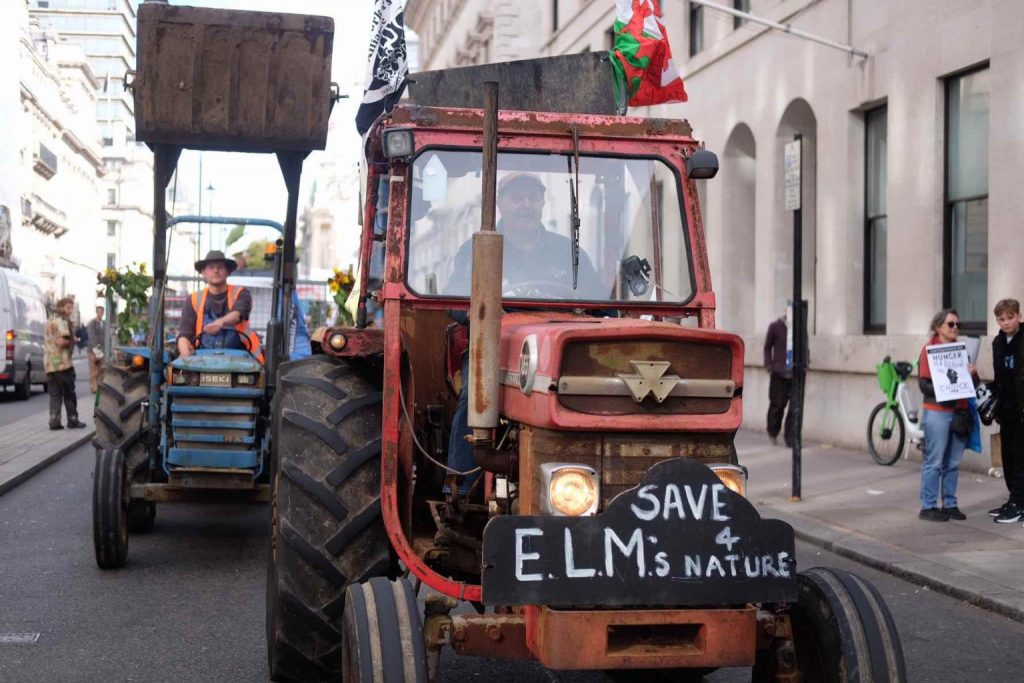“Many farmers have justified grievances about having to bear the burden of providing a vital service.” [Wildlife Trusts]
“Will the angry exchanges between farmers and their governments continue through the remainder of this decade? Very likely, YES!” [Supermarkets In Your Pocket]
.
Last month in Sidbury, farmers made their case to the Prime Minister on a visit to Devon.

Meanwhile, farmers were protesting across the EU and more than 80 tractors disrupted motorway traffic in Wales as farmers protested against government plans.
With a perspective from the Wildlife Trusts, it is indeed clear that farmers are fed up – but they have allies in the public and also in nature:
Many farmers have justified grievances about having to bear the burden of providing a vital service. Meanwhile their buyers treat them badly, don’t pay a fair price at the farmgate and set unacceptable, often utterly ridiculous standards. Retailer and supply chain treatment is getting worse and there is a lack of effective rules to stop abuse and to ensure fair negotiations, contracts and treatment (see this Sustain blog for more detail). UK Government must also change trade policy so it does not undermine our farmers and wildlife by allowing lower standards of imports or drive lower UK standards that could hurt critical natural ‘services’ provided by healthy soils and pollinating insects, which in turn support food production.
And with a perspective from the supermarket industry, it’s clear that farmers are revolting: What’s it all about and to what avail?
Farmers are often grumpy. It’s the unpredictable elements of their business such as tussling with the vagaries of the weather, market prices, awkward customers and regulators, and coping with the peccadillos of their neighbours and wayward countryside visitors. But, right now, they’re angry even furious all around the world. In India, farmers are marching on Delhi. Across Europe, capital cities are under siege. What’s it all about?
In the UK, Rishi Sunak became the first British Prime Minister in 15 years to address the National Farmers Union Conference offering £220m ($275m) to put into new food productivity schemes focussing on farm technology and automation to reduce reliance on overseas workers. He proffered plans to reduce red tape and make it easier for farmers to diversify their businesses. Farm to Fork annual food security summits have been promised and he assured farmers of milk, pigs, eggs, chicken and fresh produce that regulations would be introduced to ensure fairer contracts for them with their major customers, particularly those iniquitous supermarkets...
Will the angry exchanges between farmers and their governments continue through the remainder of this decade? Very likely, YES! Under the auspices of the United Nations, most governments have signed up to the target of reaching “Net Zero by 2050”. In COP28, completed in December 2023, a global roadmap given the thumbs up by 130+ countries was released by FAO showing the pathway for global agriculture and food to make its contribution to achieving Net Zero without allowing global temperatures to exceed 1.5C above pre-industrial levels.
Yet the EU has stumbled at the first hurdle by diluting its climate change goals, notwithstanding that the EU has already signed up to cutting gross GHG emissions from agri-food systems by 25% by 2030 and to be CO2 neutral and make significant cuts in nitrous oxide and methane emissions by 2035. You can see 2035 from here! It’s not as if EU farmers are being asked to support these green initiatives for nothing. After all, one-third of the massive EU annual budget goes to farmers, most in the form of direct farm subsidies. Looking at the farm support schemes in the EU (and the UK for that matter), Kiwi farmers must be shaking their heads as they “celebrate” the 40thanniversary of the subsidy rug being pulled from under their feet. New Zealand is a signee to the UN (FAO) Global Climate Change Road Map and the promises it has made will be delivered by its farmers largely off their own backs.
One of our principal reflections on the recent flurry and expected continuing angry exchanges between farmers and their governments is that it is indicative of lack of collaboration. High profile international events such as the COPs leading to reassuring pronouncements on a better future for our planet are more likely to be successful if they are based on firm agreement with those who must deliver the promises made, i.e. those that actually farm the land or ocean! Finally, the above views on farmer anger do not cover those producing fresh foods for sale principally via supermarkets. That’s another story and, very shortly, we’ll offer a few thoughts on this contentious topic.
…